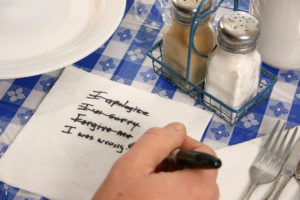
From my platform address on October, the quick summary.
What’s included in an effective apology:
- Acknowledgement that the other experienced hurt or harm.
- Acceptance that my action was a trigger for the hurt. (words are a kind of action)
- Indication I have had a change of heart.
- Indication that I will not do it again and, ideally, even will work to repair the harm. Some kind of restitution, restoration.
And my rules about apologies,
- Rule 1: include what the action actually was that triggered the hurt or harm
- Rule 2: actually say YOU did it
- 2a: don’t apologize for someone else’s actions, as in “I’m sorry you misunderstood” or “I’m sorry other people have hurt you before” — the latter is an expression of sympathy, not an apology)
- Rule 3: acknowledge that the other is hurting or harmed and what that harm is (no “IF you’re hurt”)
- Rule 4: don’t include an excuse (especially the excuse that they did something to “cause” you to do what was done)
- Rule 5: don’t minimize (words like “just” or describing the action in a way that makes it seem more minor than the other may have received it)
- Rule 6: don’t include an attack on the other (that seems pretty clear)
- Rule 7: don’t force apologies out of others (if they don’t really regret the action, or the hurt, the apology won’t ring true, and there’s no change of heart)
- Rule 8: don’t expect an apology to erase the past (repaired hurts still leave scars)
If you’d like to hear the whole platform address, it’s here: The Problem With Apologies (SoundCloud)

